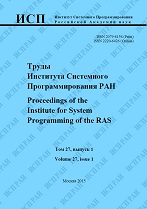|
Classification of depressive episodes using nighttime data: multivariate and univariate analysis
J. G. Rodríguez-Ruiz, C. E. Galván-Tejada, S. Vázquez-Reyes, J. I. Galván-Tejada, H. Gamboa-Rosales
Universidad Autónoma de Zacatecas
Abstract:
Mental disorders like depression represent 28% of global disability, it affects around 7.5% percent of global disability. Depression is a common disorder that affects the state of mind, normal activities, emotions, and produces sleep disorders. It is estimated that approximately 50% of depressive patients suffering from sleep disturbances. In this paper, a data mining process to classify depressive and not depressive episodes during nighttime is carried out based on a formal method of data mining called Knowledge Discovery in Databases (KDD). KDD guides the process of data mining with stages well established: Pre-KDD, Selection, Pre-processing, Transformation, Data Mining, Evaluation, and Post-KDD. The dataset used for the classification is the DEPRESJON dataset, which contains the motor activity of 23 unipolar and bipolar depressed patients and 32 healthy controls. The classification is carried out with two different approaches; a multivariate and univariate analysis to classify depressive and non-depressive episodes. For the multivariate analysis, the Random Forest algorithm is implemented with a model construct of 8 features, the results of the classification are specificity equal to 0.9927 and sensitivity equal to 0.9991. The univariate analysis shows that the maximum of the activity is the most descriptive characteristic of the model with 0.908 in accuracy for the classification of depressive episodes.
Keywords:
depression, sleep disorders, classification, data mining, kdd, random forest.
Citation:
J. G. Rodríguez-Ruiz, C. E. Galván-Tejada, S. Vázquez-Reyes, J. I. Galván-Tejada, H. Gamboa-Rosales, “Classification of depressive episodes using nighttime data: multivariate and univariate analysis”, Proceedings of ISP RAS, 33:2 (2021), 115–124
Linking options:
https://www.mathnet.ru/eng/tisp588 https://www.mathnet.ru/eng/tisp/v33/i2/p115
|

| Statistics & downloads: |
| Abstract page: | 167 | | Full-text PDF : | 60 | | References: | 27 |
|




 Contact us:
Contact us: Terms of Use
Terms of Use
 Registration to the website
Registration to the website Logotypes
Logotypes









 Citation in format
Citation in format 